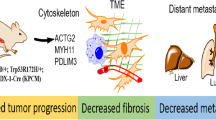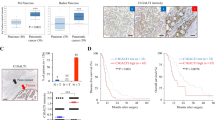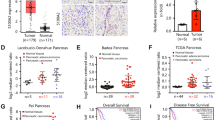Abstract
Pancreatic ductal adenocarcinoma (PDA) has one of the worst prognoses of all cancers. Mucin 1 (MUC1), a transmembrane mucin glycoprotein, is a key modulator of several signaling pathways that affect oncogenesis, motility and metastasis. Its expression is known to be associated with poor prognosis in patients. However, the precise mechanism remains elusive. We report a novel association of MUC1 with platelet-derived growth factor-A (PDGFA). PDGFA is one of the many drivers of tumor growth, angiogenesis and metastasis in PDA. Using mouse PDA models as well as human samples, we show clear evidence that MUC1 regulates the expression and secretion of PDGFA. This, in turn, influences proliferation and invasion of pancreatic cancer cells leading to higher tumor burden in vivo. In addition, we reveal that MUC1 overexpressing cells are heavily dependent on PDGFA both for proliferation and invasion, whereas MUC1-null cells are not. Moreover, PDGFA and MUC1 are critical for translocation of β catenin to the nucleus for oncogenesis to ensue. Finally, we elucidate the underlying mechanism by which MUC1 regulates PDGFA expression and secretion in pancreatic cancer cells. We show that MUC1 associates with Hif1-α, a known transcription factor involved in controlling PDGFA expression. Furthermore, MUC1 facilitates Hif1-α translocation to the nucleus. In summary, we have demonstrated that MUC1-induced invasion and proliferation occurs via increased exogenous production of PDGFA. Thus, impeding MUC1 regulation of PDGFA signaling may be therapeutically beneficial for patients with PDA.
This is a preview of subscription content, access via your institution
Access options
Subscribe to this journal
Receive 50 print issues and online access
$259.00 per year
only $5.18 per issue
Buy this article
- Purchase on Springer Link
- Instant access to full article PDF
Prices may be subject to local taxes which are calculated during checkout






Similar content being viewed by others
References
Society AC . The top 5 cancer killers are (in order): lung, colon, breast, pancreatic, and prostate. American Cancer Society. Cancer Facts & Figures 2010 American Cancer Society: Atlanta 2010.
Sener SF, Fremgen A, Menck HR, Winchester DP . Pancreatic cancer: a report of treatment and survival trends for 100 313 patients diagnosed from 1985–1995, using the National Cancer Database. J Am Coll Surg 1999; 189: 1–7.
Neoptolemos JP, Stocken DD, Friess H, Bassi C, Dunn JA, Hickey H et al. A randomized trial of chemoradiotherapy and chemotherapy after resection of pancreatic cancer. N Engl J Med 2004; 350: 1200–1210.
Burris III HA, Moore MJ, Andersen J, Green MR, Rothenberg ML, Modiano MR et al. Improvements in survival and clinical benefit with gemcitabine as first-line therapy for patients with advanced pancreas cancer: a randomized trial. J Clin Oncol 1997; 15: 2403–2413.
Baldus SE, Hanisch FG, Kotlarek GM, Zirbes TK, Thiele J, Isenberg J et al. Coexpression of MUC1 mucin peptide core and the Thomsen-Friedenreich antigen in colorectal neoplasms. Cancer 1998; 82: 1019–1027.
Lan MS, Hollingsworth MA, Metzgar RS . Polypeptide core of a human pancreatic tumor mucin antigen. Cancer Res 1990; 50: 2997–3001.
Levi E, Klimstra DS, Andea A, Basturk O, Adsay NV . MUC1 and MUC2 in pancreatic neoplasia. J Clin Pathol 2004; 57: 456–462.
Chhieng DC, Benson E, Eltoum I, Eloubeidi MA, Jhala N, Jhala D et al. MUC1 and MUC2 expression in pancreatic ductal carcinoma obtained by fine-needle aspiration. Cancer 2003; 99: 365–371.
Gendler SJ, Lancaster CA, Taylor-Papadimitriou J, Duhig T, Peat N, Burchell J et al. Molecular cloning and expression of human tumor-associated polymorphic epithelial mucin. J Biol Chem 1990; 265: 15286–15293.
Singh PK, Hollingsworth MA . Cell surface-associated mucins in signal transduction. Trends Cell Biol 2006; 16: 467–476.
Hollingsworth MA, Swanson BJ . Mucins in cancer: protection and control of the cell surface. Nat Rev Cancer 2004; 4: 45–60.
Carson DD . The cytoplasmic tail of MUC1: a very busy place. Sci Signal 2008; 1: pe35.
Kufe DW . Mucins in cancer: function, prognosis and therapy. Nat Rev Cancer 2009; 9: 874–885.
Roy LD, Sahraei M, Subramani DB, Besmer D, Nath S, Tinder TL et al. MUC1 enhances invasiveness of pancreatic cancer cells by inducing epithelial to mesenchymal transition. Oncogene 2011; 30: 1449–1459.
Besmer DM, Curry JM, Roy LD, Tinder TL, Sahraei M, Schettini J et al. Pancreatic ductal adenocarcinoma mice lacking mucin 1 have a profound defect in tumor growth and metastasis. Cancer Res 2011; 71: 4432–4442.
Tinder TL, Subramani DB, Basu GD, Bradley JM, Schettini J, Million A et al. MUC1 enhances tumor progression and contributes toward immunosuppression in a mouse model of spontaneous pancreatic adenocarcinoma. J Immunol 2008; 181: 3116–3125.
Adsay NV, Basturk O, Cheng JD, Andea AA . Ductal neoplasia of the pancreas: nosologic, clinicopathologic, and biologic aspects. Semin Radiat Oncol 2005; 15: 254–264.
Adsay NV, Merati K, Andea A, Sarkar F, Hruban RH, Wilentz RE et al. The dichotomy in the preinvasive neoplasia to invasive carcinoma sequence in the pancreas: differential expression of MUC1 and MUC2 supports the existence of two separate pathways of carcinogenesis. Mod Pathol 2002; 15: 1087–1095.
Moniaux N, Andrianifahanana M, Brand RE, Batra SK . Multiple roles of mucins in pancreatic cancer, a lethal and challenging malignancy. Br J Cancer 2004; 91: 1633–1638.
Schroeder JA, Thompson MC, Gardner MM, Gendler SJ . Transgenic MUC1 interacts with EGFR and correlates with MAP kinase activation in the mouse mammary gland. J Biol Chem 2001; 276: 13057–13064.
Hoffmann AC, Mori R, Vallbohmer D, Brabender J, Klein E, Drebber U et al. High expression of HIF1a is a predictor of clinical outcome in patients with pancreatic ductal adenocarcinomas and correlated to PDGFA, VEGF, and bFGF. Neoplasia 2008; 10: 674–679.
Wang CC, Cirit M, Haugh JM . PI3K-dependent cross-talk interactions converge with Ras as quantifiable inputs integrated by Erk. Mol Syst Biol 2009; 5: 246.
Mantur M, Koper O . Platelet- derived growth factor--the construction, role and it′s receptors. Pol Merkur Lekarski 2008; 24: 173–176.
Hellberg C, Ostman A, Heldin CH . PDGF and vessel maturation. Recent Results Cancer Res 2010; 180: 103–114.
Appelmann I, Liersch R, Kessler T, Mesters RM, Berdel WE . Angiogenesis inhibition in cancer therapy: platelet-derived growth factor (PDGF) and vascular endothelial growth factor (VEGF) and their receptors: biological functions and role in malignancy. Recent Results Cancer Res 2010; 180: 51–81.
Fujimoto K, Hosotani R, Wada M, Lee JU, Koshiba T, Miyamoto Y et al. Expression of two angiogenic factors, vascular endothelial growth factor and platelet-derived endothelial cell growth factor in human pancreatic cancer, and its relationship to angiogenesis. Eur J Cancer 1998; 34: 1439–1447.
Hwang RF, Yokoi K, Bucana CD, Tsan R, Killion JJ, Evans DB et al. Inhibition of platelet-derived growth factor receptor phosphorylation by STI571 (Gleevec) reduces growth and metastasis of human pancreatic carcinoma in an orthotopic nude mouse model. Clin Cancer Res 2003; 9: 6534–6544.
Al-Batran SE, Atmaca A, Schleyer E, Pauligk C, Hosius C, Ehninger G et al. Imatinib mesylate for targeting the platelet-derived growth factor beta receptor in combination with fluorouracil and leucovorin in patients with refractory pancreatic, bile duct, colorectal, or gastric cancer--a dose-escalation Phase I trial. Cancer 2007; 109: 1897–1904.
Hingorani SR, Petricoin III EF, Maitra A, Rajapaske V, King C, Jacobetz MA et al. Preinvasive and invasive ductal pancreatic cancer and its early detection in the mouse. Cancer Cell 2003; 4: 437–450.
Reiser-Erkan C, Erkan M, Pan Z, Bekasi S, Giese NA, Streit S et al. Hypoxia-inducible proto-oncogene Pim-1 is a prognostic marker in pancreatic ductal adenocarcinoma. Cancer Biol Ther 2008; 7: 1352–1359.
Fischer AN, Fuchs E, Mikula M, Huber H, Beug H, Mikulits W . PDGF essentially links TGF-beta signaling to nuclear beta-catenin accumulation in hepatocellular carcinoma progression. Oncogene 2007; 26: 3395–3405.
Hattrup CL, Gendler SJ . Structure and function of the cell surface (tethered) mucins. Annu Rev Physiol 2008; 70: 431–457.
Singh PK, Wen Y, Swanson BJ, Shanmugam K, Kazlauskas A, Cerny RL et al. Platelet-derived growth factor receptor beta-mediated phosphorylation of MUC1 enhances invasiveness in pancreatic adenocarcinoma cells. Cancer Res 2007; 67: 5201–5210.
Singh PK, Behrens ME, Eggers JP, Cerny RL, Bailey JM, Shanmugam K et al. Phosphorylation of MUC1 by Met modulates interaction with p53 and MMP1 expression. J Biol Chem 2008; 283: 26985–26995.
Szajda SD, Waszkiewicz N, Chojnowska S, Zwierz K . Carbohydrate markers of pancreatic cancer. Biochem Soc Trans 2011; 39: 340–343.
Castaneda CA, Cortes-Funes H, Gomez HL, Ciruelos EM . The phosphatidyl inositol 3-kinase/AKT signaling pathway in breast cancer. Cancer Metastasis Rev 2010; 29: 751–759.
Heldin CH, Ostman A, Ronnstrand L . Signal transduction via platelet-derived growth factor receptors. Biochem Biophys Acta 1998; 1378: F79–113.
Moon SW, Chung EJ, Jung SA, Lee JH . PDGF stimulation of Muller cell proliferation: Contributions of c-JNK and the PI3K/Akt pathway. Biochem Biophys Res Commun 2009; 388: 167–171.
Behrens ME, Grandgenett PM, Bailey JM, Singh PK, Yi CH, Yu F et al. The reactive tumor microenvironment: MUC1 signaling directly reprograms transcription of CTGF. Oncogene 2010; 29: 5667–5677.
Singh A, Settleman J . EMT, cancer stem cells and drug resistance: an emerging axis of evil in the war on cancer. Oncogene 2010; 29: 4741–4751.
Thompson EJ, Shanmugam K, Hattrup CL, Kotlarczyk KL, Gutierrez A, Bradley JM et al. Tyrosines in the MUC1 cytoplasmic tail modulate transcription via the extracellular signal-regulated kinase 1/2 and nuclear factor-kappaB pathways. Mol Cancer Res 2006; 4: 489–497.
Mukherjee P, Basu GD, Tinder TL, Subramani DB, Bradley JM, Arefayene M et al. Progression of pancreatic adenocarcinoma is significantly impeded with a combination of vaccine and COX-2 inhibition. J Immunol 2009; 182: 216–224.
Spicer AP, Rowse GJ, Lidner TK, Gendler SJ . Delayed mammary tumor progression in Muc-1 null mice. J Biol Chem 1995; 270: 30093–30101.
Al Masri A, Gendler SJ . Muc1 affects c-Src signaling in PyV MT-induced mammary tumorigenesis. Oncogene 2005; 24: 5799–5808.
Acknowledgements
We acknowledge the Mayo Clinic Histology Core and the UNC-Charlotte vivarium staff for maintaining our mouse colonies. This study is supported by RO1 CA118944 and P50CA102701.
Author information
Authors and Affiliations
Corresponding author
Ethics declarations
Competing interests
Drs Mukherjee's and Gendler's work has been funded by the NIH. The remaining authors declare no conflict of interest.
Additional information
Supplementary Information accompanies the paper on the Oncogene website
Rights and permissions
About this article
Cite this article
Sahraei, M., Roy, L., Curry, J. et al. MUC1 regulates PDGFA expression during pancreatic cancer progression. Oncogene 31, 4935–4945 (2012). https://doi.org/10.1038/onc.2011.651
Received:
Revised:
Accepted:
Published:
Issue Date:
DOI: https://doi.org/10.1038/onc.2011.651
Keywords
This article is cited by
-
Therapeutic effect of a MUC1-specific monoclonal antibody-drug conjugates against pancreatic cancer model
Cancer Cell International (2022)
-
The multifaceted role of MUC1 in tumor therapy resistance
Clinical and Experimental Medicine (2022)
-
Crosstalk between MUC1 and VEGF in angiogenesis and metastasis: a review highlighting roles of the MUC1 with an emphasis on metastatic and angiogenic signaling
Cancer Cell International (2021)
-
Targeting hypoxic tumor microenvironment in pancreatic cancer
Journal of Hematology & Oncology (2021)
-
Glycometabolic rearrangements--aerobic glycolysis in pancreatic cancer: causes, characteristics and clinical applications
Journal of Experimental & Clinical Cancer Research (2020)



